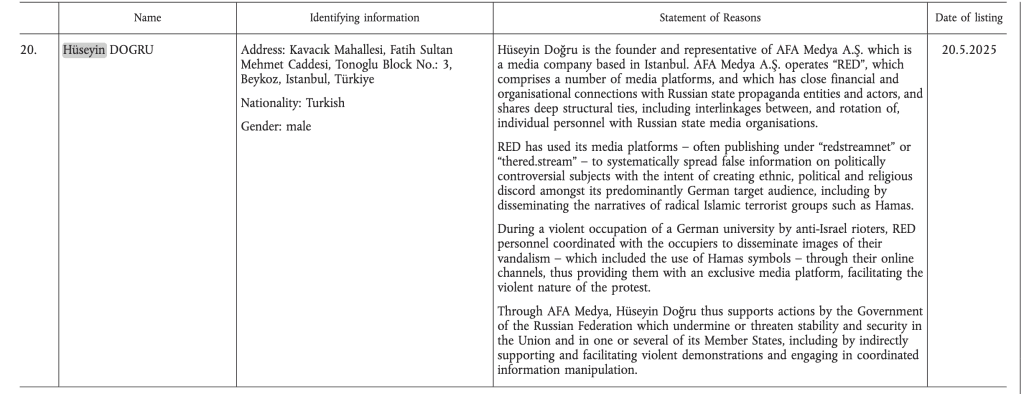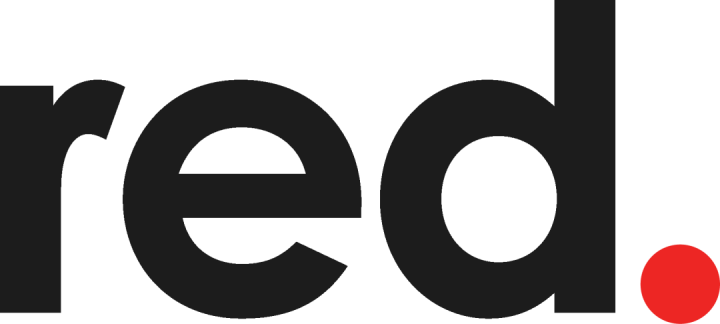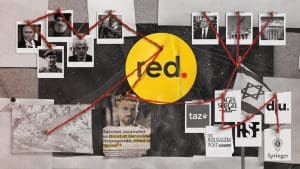The EU Council’s latest sanctions, intended to deter Russia’s war on Ukraine, include red. media founder Hüseyin Doğru, and AFA Medya (which operates red.), citing their coverage of Germany’s pro-Palestine protests which the council claims “supports” Russia.
Since the EU began rolling out one sanctions package after another in the wake of Russia’s 2022 invasion of Ukraine, the targeting of Doğru marks the first time the EU has used this weapon in the service of Germany’s crackdown on Palestine solidarity, a crackdown which has been condemned by UN officials and human rights groups.
The sanctions listing of Doğru claims that red. has “systematically spread false information on politically controversial subjects with the intent of creating ethnic, political and religious discord amongst its predominantly German target audience.” The only evidence it provides of this damning claim is red.’s exclusive coverage from Berlin during the pro-Palestine student uprising that swept university campuses around the whole world.
From the German capital, red. earned the trust of Palestine solidarity activists by being the only media outlet not complicit in the crackdown against them—gaining exclusive access to their Humboldt University occupation. Instead of praise, this scoop drew hostility from German media, which soon began accusing red. of organizing the protests and being linked to Russia, claims which developed into a full-fledged campaign against red. across German media and by the German state, causing us to shut down. This baseless narrative not only fueled censorship against us but also criminalized the activists by associating them with a “hostile” foreign power. Though never substantiated, these claims were echoed by then–U.S. Secretary of State Antony Blinken and have now evolved to form the central basis for sanctioning red.’s founder. The EU sanctions listing claims:
During a violent occupation of a German university by anti-Israel rioters, RED personnel coordinated with the occupiers to disseminate images of their vandalism – which included the use of Hamas symbols – through their online channels, thus providing them with an exclusive media platform, facilitating the violent nature of the protest.
The EU Council’s claim that red. “coordinated with the occupiers” to “disseminate images of their vandalism,” thereby “facilitating the violent nature of the protest,” is deeply troubling. Journalists naturally engage with their subjects and report on their actions—how else are we meant to do our job?
red. gained exclusive access only because no other German outlet had consistently covered Israeli war crimes, Germany’s complicity in them, or Berlin’s crackdown on pro-Palestine activists. Had others done so, they too would’ve been welcomed. Instead, mainstream media doxxed activists on their front pages and fueled their criminalization.

Since October 2023, red. has provided in-depth coverage of the German state and media’s violations of international law and the democratic rights of its citizens. As Germany’s media landscape increasingly transformed into a uniform voice echoing state narratives in support of Israel’s war crimes—and as the political climate in Germany shifted sharply to the right—a glaring void emerged. We felt a responsibility to fill that gap. Leveraging our deep knowledge of Germany and our networks on the ground, red. sought to shine a light for international audiences on the alarming developments unfolding there. Our rigorous, consistent and factual reporting resonated and was shared widely—not because it was sensational, but because no one else was covering these issues.
Crucially, however, our audience has always been overwhelmingly international. Our content is published almost exclusively in English, and our analytics confirm that our primary audience is in English-speaking countries like the US and UK—not Germany. Yet the Council justifies its sanctions by alleging our “intent” is to sow discord among a predominantly German audience, “including by disseminating the narratives of radical Islamic terrorist groups such as Hamas.” This claim is not only unfounded—it cynically misrepresents who we are, what we do, and who we speak to.
Further, the Council’s text offers no evidence to back up its claim that red. has spread Hamas narratives. We can only infer that the German media and state’s habit of equating the mildest criticism of Israel with Hamas propaganda has been extended here. Perhaps they refer to our past interview with officials from pro Palestinian resistance groups, including Hamas —again a normal journalistic practice aimed at representing key perspectives in a global conflict. Would CNN be sanctioned for interviewing Abu Mohammad al-Jolani (now better known as Ahmad al-Sharaa) last year when he was still a designated terrorist with a $10 million bounty on his head? Hardly. The hypocrisy is stark: on the very day the EU sanctioned red. for allegedly amplifying “terrorist” Hamas, it lifted sanctions on Syria—now led by al-Sharaa, a former ISIS fighter and ex-head of Al-Qaeda’s Syrian branch.
The claim that standard journalistic practices—when they challenge the dominant narratives of EU member states—amount to “sowing discord” and therefore warrant sanctions sets a dangerous precedent. But it follows a trajectory the EU has been on since 2015, beginning with the creation of EUvsDisinfo and later expanding through instruments that weaponize “disinformation” the EU claims “undermine” the bloc or the “democratic legitimacy” of its representatives. With these latest sanctions, the Council goes further still, equating red.’s critical reporting on Germany with “supporting” the Russian government.
It begins by repeating an unsubstantiated claim, widely echoed in German media, that red. is linked to the Russian state simply because some of its journalists previously worked for Redfish (an editorially independent project funded by RT’s news agency Ruptly) or Ruptly itself. By this logic, BBC, CNN, Deutsche Welle, Al Jazeera, Berliner Zeitung, and Channel 4 News would all be “connected” to the Russian state, given their employment of former RT journalists. In reality, the vast majority of red.’s staff have no such background.
The accusations used to sanction me and red. media read like an act of revenge by the German state for exposing its own complicity. This revenge has one after the other been delivered through German media outlets, journalists, trade unions, and NGOs, and now ultimately formalized through EU sanctions.
But the argument becomes even more tenuous—and troubling. The EU implies that because red.’s coverage has been inconvenient for certain member states (Germany, notably), and because Russia is also inconvenient for those same states, red. must therefore be “supporting” Moscow.
This reasoning culminates in the following claim:
Through AFA Medya, Hüseyin Doğru thus supports actions by the Government of the Russian Federation which undermine or threaten stability and security in the Union and in one or several of its Member States, including by indirectly supporting and facilitating violent demonstrations and engaging in coordinated information manipulation.
Not only is this the first time the EU has used sanctions in defense of Ukraine to target critical media coverage of repression against the right to assembly within the bloc, it may also be the first time the EU has sanctioned an individual and media outlet that has consistently criticized Russia’s invasion of Ukraine. Neither red. nor its founder has ever defended Russia’s actions in Ukraine. On the contrary, red. Has consistently characterized Russia an imperialist power pursuing its own geopolitical interests like the U.S., China, EU, and NATO. We reject all their policies and military actions. We have publicly criticized the invasion of Ukraine and reported on opposition figures being arrested, and made clear in our reporting that this war is a war between two imperialist blocs.
What’s more, the EU’s sanctions represent a grave escalation in the conflation of independent journalism with foreign interference. By framing red.’s reporting—particularly its critical coverage of Germany’s suppression of Palestine solidarity protests—as “support” for Russia, the EU sets a precedent that threatens press freedom across the bloc. The allegations rest on flimsy associations, distorted interpretations of journalistic practice, and a troubling trend of labeling dissent as disinformation. That red. is being punished not for spreading falsehoods, but for reporting inconvenient truths, should concern everyone. At its core, this is not about red. or even Russia—it is about the shrinking space for critical journalism and free speech in Europe.
Despite repeated attempts by German media and now even by officials at the highest levels of the US and EU to discredit us, not a single instance of false reporting by red. or any member of our team has been presented.
red. Media founder Hüseyin Doğru believes the sanctions were pushed by Germany as part of its escalating crackdown on dissent, targeting him to set an example and deter others who dare to raise their voice against the crimes being perpetrated by the most powerful forces in the world. Doğru said: “The accusations used to sanction me and red. media read like an act of revenge by the German state for exposing its own complicity. This revenge has one after the other been delivered through German media outlets, journalists, trade unions, and NGOs, and now ultimately formalized through EU sanctions. All of these actors and institutions are meant to safeguard our democratic rights but they have been cynically transformed into instruments of repression against journalists and activists. This is a blatant violation of the freedoms the West claims differentiate it from the “uncivilized” rest of the world, and evokes the tactics of authoritarian regimes.
I call on all international institutions who are concerned with our fundamental freedoms and human rights —the United Nations, Amnesty International, Reporters Without Borders International, and the International Federation of Journalists—to urgently investigate our case and hold accountable those responsible for enabling this assault on press freedom.
This is not just an attack on red. media—it is an attack on journalism itself. Today it is us. Tomorrow, it will be anyone who dares to dissent.”
Press contact: info@thered.stream, Hüseyin Dogru



